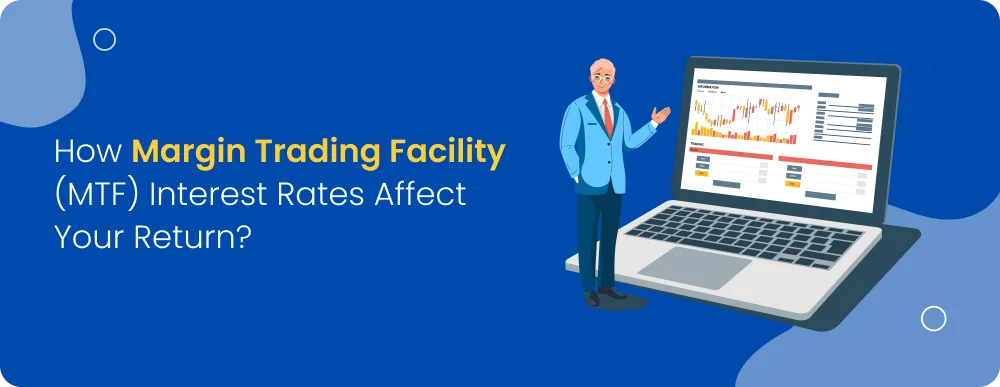How Margin Trading Facility (MTF) Interest Rates Affect Your Return
Noor Kaur
11 Nov 2025Tags:
Market recap
key Takeaways
- MTF lets you buy more shares with limited capital, but the interest on borrowed funds directly affects your net returns.
- It works best for short- to medium-term trades with clear momentum, and not long-term investing.
- Daily interest accrual means holding positions longer quietly erodes gains.
- To maximise returns, compare brokers’ rates, avoid over-leveraging, and exit trades quickly when returns flatten.
Leverage can magnify your profits, but it can also quietly shrink them. That’s the trade-off behind the Margin Trading Facility (MTF). While MTF lets you buy more shares with limited capital, the interest charged on borrowed funds becomes a crucial factor in determining your net gains.
In this blog, we’ll explore how MTF interest directly impacts your return, why managing it matters just as much as market timing, and how you can keep borrowing costs under control while maximising potential gains.
What Is Margin Funding Or Margin Trading Facility (MTF)?
Margin Trading Facility (MTF) allows investors to buy stocks by paying only a portion of the total value upfront, with the rest funded by the broker. In simple terms, it’s a credit facility for stock trading—the broker lends you money to increase your buying power in the market.
Benefits Of MTF In The Stock Market
Using MTF strategically can give traders and investors a strong advantage. Here’s how:
Higher Buying Power: You can take larger positions than your available cash allows, helping you capture opportunities during market rallies.
Efficient Capital Use: MTF helps you free up liquidity for diversification or other investments while still maintaining your core stock positions.
Short-Term Leverage Advantage: Ideal for short- to medium-term trades where quick price movements can generate profits greater than the borrowing cost.
No Need to Sell Long-Term Holdings: If you spot an opportunity but lack cash, MTF lets you act without liquidating your existing portfolio.
Easy Availability through Brokers: Most major brokers like Zerodha, ICICI Direct, HDFC Securities, and Angel One offer the best margin rates and simple eligibility checks for MTF users.
What Is The MTF Interest Rate?
The MTF interest rate is the cost you pay to your broker for borrowing funds under the Margin Trading Facility (MTF). When you buy shares using MTF, the broker lends you money for a portion of your trade value and charges interest on that borrowed amount until you repay it or square off your position.
Typically, MTF interest rates in India depends on factors such as:
Your broker’s pricing policy
The type of stock and its volatility
Your trading volume and account category
Market liquidity and risk conditions
How To Calculate MTF Interest Rates?
MTF interest is calculated daily on the borrowed amount using this formula:
MTF Interest = (Borrowed Amount × Annual Interest Rate ÷ 365) × Number of Days Held
Let’s say you buy shares worth ₹1,00,000 using MTF. You pay ₹40,000, and your broker funds ₹60,000 at an MTF interest rate of 12% per annum. You hold the shares for 10 days. This way, you’ll pay around ₹197.26 as interest for the 10-day holding period.
Strategies To Manage Interest Cost And Maximise Returns
Here are some practical strategies to manage your interest and maximise returns:
Use MTF for Short- to Medium-Term Trades
The longer you hold a position, the more interest accumulates. MTF works best for trades lasting a few days to a few weeks, where quick price movements can offset the borrowing cost.
Monitor Interest Accrual Daily
Keep track of how much interest is being charged each day. Most brokers show this in your account dashboard. Exiting trades quickly when returns flatten helps control costs.
Avoid Over-Leveraging
Borrow only what you can comfortably repay. Taking large leveraged positions magnifies both profits and losses and can lead to margin calls in volatile markets.
Align Leverage with Market Momentum
Use MTF strategically during strong market trends where price direction is clear. Avoid using it in sideways or uncertain markets where gains are limited but interest keeps accruing.
When To Use Margin Trading Facility (MTF) Wisely
Here’s when using MTF makes sense:
During Clear Uptrends: When market momentum is strong and you have high conviction in a stock’s short-term performance.
For Short-Term Opportunities: Use MTF for trades you plan to exit within days or weeks, and not months.
When Borrowing Costs Are Low: Enter MTF positions when brokers are offering the lowest margin rates to keep your costs minimal.
For Blue-Chip or Fundamentally Strong Stocks: Prefer quality stocks with liquidity and low volatility. Avoid speculative or penny stocks under MTF.
When You Have a Stop-Loss Plan: Always define exit levels to prevent losses from snowballing because of leverage.
Suggested Read: Is MTF The Smartest Way To Trade In Volatile Markets?
Conclusion:
MTF can amplify trading returns, but it works best when you fully understand the cost of leverage using a reliable MTF trading app or platfrom.
FAQs
How do MTF rates affect investments?
MTF interest rates directly impact your overall cost of trading. A higher MTF rate means a greater interest burden on borrowed funds, which can eat into profits if the stock doesn’t perform as expected. Choosing brokers with the best margin rates helps traders optimise returns and manage leverage effectively.
What is the interest on the margin trading facility MTF?
The MTF interest rate is the rate charged by brokers on the borrowed amount used to buy shares under the Margin Trading Facility. It depends on the broker, stock, and holding period. Always review margin interest rates comparison across platforms before availing MTF.
Is MTF good for long-term investment?
MTF is designed mainly for short- to medium-term trading, not long-term investing. Since the interest cost accumulates daily, holding stocks for extended periods under MTF can lead to significant interest expenses, potentially reducing overall gains.
What factors determine MTF interest rates?
MTF rates depend on multiple factors, such as:
The broker’s pricing policy and funding source
Stock category and its risk profile
The borrower’s trading volume and creditworthiness
Market conditions and demand for leverage
Can high MTF interest rates lead to losses?
Yes, if the MTF interest cost outweighs the price appreciation of your stocks, your position can turn unprofitable despite market gains. High leverage amplifies both potential profits and losses, making interest rate awareness essential for disciplined trading.
Who can avail the Margin Trading Facility (MTF)?
Any registered trader or investor with an active trading and Demat account can apply for MTF, provided their broker supports it. KYC compliance, margin requirements, and risk disclosures are mandatory before availing the facility.
Noor Kaur
11 Nov 2025Related blogs
Sign up to our newsletter !
Share this article on
Recent articles
Tags:
Open a Demat Account in just 15 minutes !

Click on open
account below

Fill out some
basic details

Upload your
documents

Start trading in
24 Hours *
Commonly asked questions
Is Master Capital Services Limited SEBI registered?
Do you have a mobile app for Trading and Finance Management?
What services does mastertrust provide?
What is the minimum investment required to start trading with your company?
Is my personal and financial information secure with your company?
What is your customer support availability?





